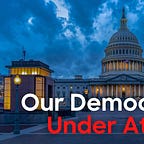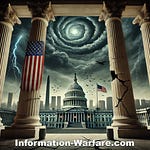By Hase Fiero
In the story of American democracy, each generation has faced its own battle to uphold the promises laid out in the Declaration of Independence and the Constitution. From the Civil War to the Civil Rights Movement, democracy in the United States has been repeatedly tested. However, in recent years, the threats to this system have shifted from obvious physical conflicts to an insidious assault from within. Today, American democracy is under attack, and this time the battleground is digital, psychological, and ideological.
A System of Ideals in Perpetual Struggle
The founders of the United States crafted a government based on the novel idea of popular sovereignty: that power should derive from the people, not monarchs or aristocrats. This experiment in democracy was by no means flawless, nor was it universally supported. In fact, even as the ink was drying on the Constitution, fierce debates erupted regarding the limits of federal power, states’ rights, and the balance of liberty and order. These conflicts underscore a crucial point: American democracy has always been fragile, a work in progress, and continually tested.
The Civil War was one of the most violent reminders of these tensions, laying bare the fragility of the Union. In its aftermath, the U.S. emerged with a renewed, if imperfect, commitment to democracy. This commitment, however, was again strained during the rise of industrialization and corporate monopolies, which exerted disproportionate influence on American politics. In response, progressive reforms were introduced in the early 20th century to curb corporate power, ensure free and fair elections, and expand democracy to more citizens.
The fight for democracy continued through two World Wars, the Great Depression, and the Civil Rights Movement, with Americans consistently rallying against threats to democratic ideals. Each era produced its champions of freedom and equality, individuals and groups who believed in expanding democracy and protecting it against forces seeking to narrow its reach. However, with the advent of the digital age and the rise of powerful new information technologies, democracy now faces challenges that were scarcely imaginable in previous eras.
The Digital Age: New Tools for Ancient Tactics
In the 21st century, the tools developed to expand knowledge, foster connections, and spread American values have paradoxically become tools that can be weaponized against democracy itself. Social media platforms, data analytics, and AI-driven content algorithms, largely pioneered by American companies, were initially celebrated as symbols of progress and innovation. The promise of a global village where information flowed freely seemed to align with democratic ideals.
But as the last decade has shown, these tools are double-edged swords. The same social media platforms that allowed people to connect across continents also became fertile grounds for disinformation campaigns, echo chambers, and ideological polarization. By design, these platforms are structured to maximize engagement, often at the expense of truth and balance. Algorithms prioritize sensational content, which typically includes inflammatory or divisive information. In doing so, they create echo chambers, where users see only information that aligns with their pre-existing beliefs, further entrenching divisions.
This has been exploited by both foreign and domestic actors. In the 2016 U.S. presidential election, Russian operatives used social media to sow discord, exacerbate political divides, and undermine trust in the electoral process. Similar tactics have since been employed by other adversaries, with varying degrees of success. These campaigns seek to erode confidence in democratic institutions by polarizing the electorate and fueling skepticism towards democratic processes.
A History of Information Warfare
Propaganda and disinformation are not new to American politics. During the Cold War, both the United States and the Soviet Union engaged in extensive information warfare. However, those campaigns were largely limited to radio broadcasts, printed leaflets, and other traditional media. The difference today is the speed, reach, and psychological impact of digital disinformation. False information can go viral within minutes, reaching millions of people worldwide. The psychological impact is amplified as users spend hours daily on platforms that blend news, entertainment, and social interaction.
Moreover, the new wave of information warfare is not just about misleading or dividing people. It’s about undermining the very notion of objective truth. In a world where facts are increasingly politicized, people become suspicious of not only the information they receive but also the institutions meant to deliver it: the press, the judiciary, and even scientific bodies. This erosion of trust in institutions is dangerous, as democracy relies on informed citizens who can make reasoned decisions about their governance.
The Erosion of Democratic Norms
Beyond the technological factors, the current crisis facing American democracy also stems from an erosion of democratic norms. In recent years, we have seen an increasing willingness among political leaders to disregard the principles that have traditionally upheld the democratic process. The rejection of electoral outcomes, attempts to delegitimize the press, and attacks on judicial independence all signal a troubling departure from democratic conventions.
Historically, one of the hallmarks of American democracy has been the peaceful transfer of power, a norm that dates back to the early republic. This tradition was famously demonstrated when George Washington voluntarily relinquished the presidency after two terms. Such actions set the tone for a political culture that valued restraint and respected the rule of law. Yet, recent events have shown a dangerous shift, with political leaders increasingly willing to incite divisions and even cast doubt on the electoral process itself when it does not serve their interests.
A Call for Media Literacy and Civic Engagement
In the face of these challenges, protecting American democracy will require more than new laws or policies; it will demand a reinvigorated sense of civic duty and media literacy. In a time when misinformation and disinformation can spread rapidly online, Americans must cultivate critical thinking skills to discern fact from propaganda. Educational institutions and media organizations can play a significant role in promoting digital literacy, helping citizens understand how information is created, distributed, and manipulated.
Moreover, public discourse must prioritize substance over spectacle. One of the hallmarks of a healthy democracy is an informed electorate that engages in meaningful dialogue. When political debate is reduced to sound bites, slogans, or conspiracy theories, the substance of democracy—debate, compromise, and informed decision-making—falls by the wayside. To prevent this, Americans must hold both their media and their leaders accountable, demanding accurate information and substantive discussions on the pressing issues facing the nation.
Reforming Technology: Transparency and Responsibility
The tech industry, too, must be held accountable. For too long, technology companies have prioritized growth and engagement over societal well-being. Transparency in algorithms and content moderation practices is essential to restoring public trust. Policymakers should consider legislation that encourages accountability for content, particularly when platforms are used to spread harmful disinformation. These reforms should not stifle free speech but should instead encourage responsibility among tech companies that wield significant power over the public discourse.
Learning from History to Protect Democracy’s Future
Throughout American history, moments of crisis have often served as catalysts for reform. The Progressive Era, the New Deal, and the Civil Rights Movement each arose in response to significant social and political challenges, and each ushered in reforms that strengthened democracy. Today’s information war presents a similar challenge, one that calls for renewed commitments to democratic values, truth, and accountability.
The United States has long been a beacon of democracy, but it cannot remain so without addressing the challenges of the digital age. By fostering media literacy, promoting transparency in technology, and recommitting to democratic norms, Americans can preserve their democratic heritage for future generations. The stakes could not be higher, and history will judge how the current generation responds.
Conclusion: The Work of Democracy is Never Finished
As Abraham Lincoln stated during one of the darkest times in American history, the nation must dedicate itself to the “unfinished work” of democracy. Protecting democracy in the 21st century will require resilience, vigilance, and adaptability. The tools that have become weapons in the information war must be repurposed as instruments of enlightenment and empowerment. If history has taught us anything, it is that democracy’s greatest strength lies in its ability to self-correct. But that correction requires active participation, informed citizens, and leaders who prioritize the collective good over personal gain. The challenge is great, but so too is the resolve that has sustained American democracy for over two centuries.
The work of democracy may never be complete, but the responsibility to protect it rests in the hands of every American.












